Feneberg changes its minced meat packaging to a new sustainable solution
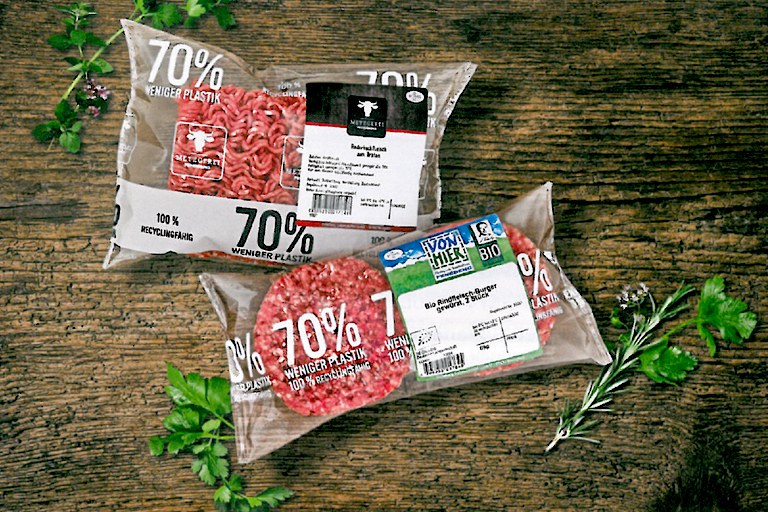
As the first German food retailer ever, Feneberg has completely changed its production and no longer offers its self-service minced meat products in the almost 80 branches in the previously standard MAP tray, but exclusively in the sustainable flow-pack. The Allgäu pioneer developed and implemented the new packaging idea together with ULMA Packaging GmbH, based in Memmingen.
"As a regionally rooted family business, Feneberg stands for values such as homeland, quality and trust. The regional production of food and the connection with the region and the people who live there, have always played a central role at Feneberg. Regional production, close partnerships with farmers, animal welfare and environmental protection have been the key points that characterise the production of our meat and sausage products for many years. With this in mind, it was important for us to also evolve in the packaging of our high-quality products and choose an alternative that continues the sustainability criteria in production," says Hannes Feneberg, who together with his brother Christof is thethird-generation Managing Director of Feneberg Lebensmittel GmbH.
Switching to flow pack packaging was an important step for the company, because every week the Feneberg butchery in Kempten produces a total of 20 tonnes of minced meat and minced meat products such as burger patties. The most important thing for Feneberg: customers go along with the sustainable path. "The new packaging is very well received. We have obviously hit the nerve of our customers, who want more sustainability in their shopping," Hannes Feneberg sums up positively.
70 per cent less plastic
The big advantage of the flow pack wrapping: with a package of 60-65 µ, it is up to 10 times thinner than conventional MAP trays, which are usually 450-650 µ thick. In addition, the flow pack package is significantly lighter than the tray: instead of weights of 13.58 g to 24.98 g for tray packaging, the flow pack solution weighs just between 4.00 g and 4.94 g, depending on the size. As a result, Feneberg saves at least 70 per cent plastic per packaging unit, at production peak times even more than 80 per cent. Calculated over the year, that's 35.7 tonnes less plastic that Feneberg puts into circulation.
Fully recyclable
Another sustainability plus for the flow packs: they are made of the multi-layer film, from the mono-material polypropylene (PP), and are therefore completely recyclable. The flow pack packages make it particularly easy for the final consumer to recycle: open the packaging, take out the meat and the film can be placed unwashed in the yellow bag and thus fed into the recycling process. "This simple handling without further separation convinced us," explains Christian Gareiß, Head of Production Technology at Feneberg. "Many other packaging concepts that save plastic require an intermediate step from the final consumer. Often, as an example, you have to pull a film off the carton, which from experience, is not always done.
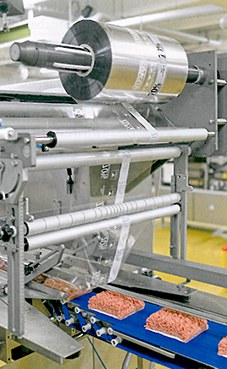
To optimise the flow pack packaging process, the folding geometry of the film was changed.
The packaging then ends up in the residual waste. That is the end of the line for recycling before it has even begun," Gareiß continues.
Less plastic does not mean less quality and hygiene - on the contrary. "The flow pack replaces 1:1 the technical properties of the MAP tray," explains Thomas Blümel, Managing Director of ULMA Packaging GmbH. The multilayer film made of mono-material consists of more than 95 per cent polypropylene (PP) as well as a thin high-barrier and thus keeps the minced meat products fresh and appetising at the highest level. Thanks to its protective atmosphere, the flow pack is also easily stackable without damaging the minced meat.
Feneberg in brief
Feneberg, the company based in Kempten, has been the supermarket from the Allgäu region for over 70 years. The family has been behind it from the very beginning. Today, Christof and Hannes Feneberg are the third generation to run the company. As a family business with regional roots, Feneberg embodies the values of homeland, quality and trust. With its own brands and production facilities, Feneberg is strongly committed to regionally produced food. The company operates just under 80 shops and employs around 3,200 people.
The Feneberg butchery produces fresh meat and sausage products every day, as well as delicacies and convenience products under the Gourmella brand. The meat used comes from contracted farmers in the region.
Packaging know-how from the Allgäu
The self-service minced meat products are packaged at the production site of the Feneberg butchery in Kempten by the FM 300 flow-pack machine from ULMA. Some adaptations were made to the machine technology for the recyclable PP film. "On the one hand, we have adapted the folding geometry, as PP film buckles more quickly than other films. Secondly, we have made changes to the longitudinal and transverse sealing in order to guarantee the usual high sealing quality for the recycled film as well," explains Alexander Biechteler, Head of Technical Sales and Application Technology at ULMA Packaging GmbH. In addition, further parameters as well as several background processes were readjusted and optimised for the new type of minced meat packaging.
Longstanding cooperation
Thanks to its robust stainless steel frame construction, the FM 300 is particularly easy to clean and disinfect. It is therefore used wherever a particularly high level of hygiene is required, such as in the packaging of fresh food. Together with the new tubular bag machine, Feneberg uses a total of seven ULMA machines in its production. In addition to packaging machines for minced meat, sausage, sausage and other cut products, there are also machines for baked goods and ready meals.
"It was clear to us that we would do this important project together with ULMA. We have been working together for ten years and know the machines very well. In addition, we value ULMA as a particularly reliable partner who is always open to new ideas," emphasises Christian Gareiß.
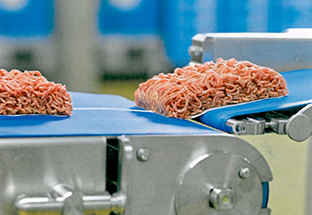
The FM 300 flow pack machine was optimally integrated into the production process.
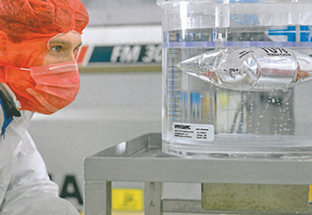
The Feneberg team, here Production Manager Christian Gareiß, checks the tightness of the flow pack packaging on a random basis.
Less logistics effort and lower CO2 emissions
Before the conversion to flow packs, one pallet of MAP trays was sufficient for 2,880 to 5,040 sales packages of minced meat and minced meat products. From the same transport volume with flow pack material, Feneberg now generates between 64,800 and 81,000 sales packs. In other words: "Instead of 100 truckloads of MAP trays, we now need just 7 truckloads of film. That is a reduction of 93 per cent. The savings in storage are just as great," Gareiß explains.
The advantages on the economic side also have an effect on the ecological side. Due to the enormous material savings and the reduced use of lorry transports, the flow packs ultimately also significantly reduce CO2 emissions. The smaller packaging volume - compared to the MAP tray - also reduces the electricity consumption for the storage, production and cooling of the products in the innovative flow pack packaging.
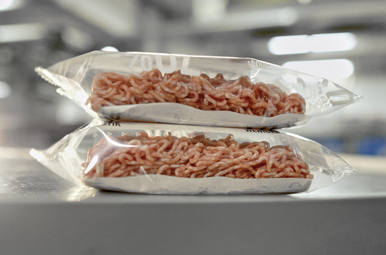
In the tubular bag, the minced meat is well protected against undesired external effects and is not crushed.
All self-service meat in the flow pack
"The flow pack is the packaging of the future in the food industry. There is no way around it. We can't do without plastic completely with this type of products, but we can reduce the amount enormously. And after use, we can recycle the material completely - that's what a responsible approach to the environment looks like," Alexander Biechteler emphasises. This offers the food and packaging industry enormous potential that can be exploited quickly. "Flow-pack packaging is a mature technology that doesn't have to be reinvented, it can really be implemented right away," says Thomas Blümel, thinking holistically: "For almost all products that are currently still packaged in MAP trays, the switch to flow pack is feasible. So why wait?" Feneberg shares this view. In the next step, the family-owned company from Allgäu wants to convert all self-service meat to flow pack packaging.


